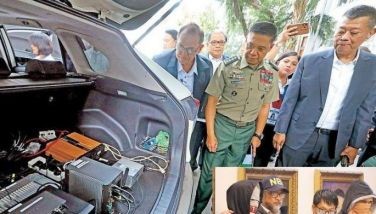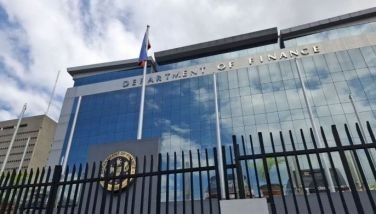Cha-cha in October with or without Senate — JDV
August 19, 2005 | 12:00am
The House of Representatives will start proposing Charter changes in October with or without the cooperation of the Senate, Speaker Jose de Venecia Jr. said yesterday.
He told reporters that congressmen would prefer to sit down with senators in a constituent assembly to recommend constitutional amendments.
"We regard them as our equal partners. But if they refuse again, as they did so several times in the past, we will have no choice but to proceed," he said.
De Venecia said "it is the Senate’s duty to face up to the question — to debate the issue with its proponents before the bar of public opinion. The Senate cannot — like the fabled ostrich — bury its head in the sand. The Senate cannot escape seeing the failure of the constitutional system we have borrowed — unexamined — from our colonial masters."
De Venecia supported the assertion made last Tuesday by Cagayan de Oro City Rep. Constantino Jaraula, who chairs the House committee on constitutional amendments, that the larger chamber of Congress can go it alone on Cha-cha.
Senate President Franklin Drilon had said congressmen would just be wasting their time and precious taxpayers’ money if they proceeded with proposing Charter changes without the input of the Senate.
Even Sen. Miriam Defensor Santiago, a staunch defender of President Arroyo, thinks that the House cannot bypass the Senate on Cha-cha.
Santiago instead suggested that congressmen put up a "psychiatric hotline" for those repeatedly pushing to amend the Constitution because Charter change moves are unlikely to prosper in the Senate.
Santiago joked about installing psychiatric hotlines at the House of Representatives in a bid to block the Cha-cha moves of De Venecia. Cha-cha is also being espoused by Santiago’s arch nemesis, former President Fidel Ramos.
De Venecia said the Constitution provides that Congress may propose constitutional amendments by a "vote of three-fourths of all its members."
"It does not say that the Senate and the House will have to vote separately. It says the vote should be three-fourths of all its members," he said.
He said if no senators show up when they invite them to begin proposing Charter changes, all they have to do is obtain the votes of 195 members of the House, or three-fourths of the 260 combined membership of the two chambers.
"But we are confident that some of them will show up. We already have the assurance of Senators Edgardo Angara, Juan Ponce Enrile and Richard Gordon. We are proud of these three, especially Senator Angara, who will carry the ball for Cha-cha in the Senate," he added.
He pointed out that if Angara, Enrile and Gordon show up in the Cha-cha sessions in October, their votes will be added to those of 195 House members "and we will have more than three-fourths to approve proposed constitutional amendments."
Angara and Enrile belong to the opposition, which has been struggling to expel them, while Gordon is an administration ally.
Revealing the House Cha-cha timetable, De Venecia said the proposed Charter changes should be finished in November so that they could be submitted to the people for ratification or rejection in a plebiscite in January or February next year.
"We should be done by February at the latest. By then, the presidential system, which has not worked for us, would have been replaced by the parliamentary type of government," he said.
Responding to questions from reporters, De Venecia said there were two proposals on what type of parliamentary government could be set up, both of which would affect Mrs. Arroyo’s term of office, which expires in 2010.
He said one suggestion is to have a French-type system under which the President would remain in office with undiminished powers but would be assisted by a prime minister in running the country.
Though the Speaker did not mention it, this was the setup that former president Ferdinand Marcos experimented with after the nominal lifting of martial law. His prime minister and concurrent finance minister was Cesar Virata, who is now a banker.
De Venecia said another proposal is for Mrs. Arroyo to continue in office as a ceremonial president, much like the queen of England. The stronger leader would be the prime minister, who is elected by parliament, he said.
However, he said after Mrs. Arroyo’s term expires in 2010, the president should just become a ceremonial head of state.
As for the shift to the parliamentary system, the Speaker said that, theoretically, it could either take place upon the ratification of the proposed Charter changes when the present Congress converts to a parliamentary body, or in June 2007, when a new parliament is elected.
If the present Senate and House were to be converted into a parliament upon the ratification of a new Constitution, all congressmen and the 12 senators elected in 2001 would end their terms of office in 2007, while senators elected last year would become automatic members of the next parliament, he said. — With Christina Mendez
He told reporters that congressmen would prefer to sit down with senators in a constituent assembly to recommend constitutional amendments.
"We regard them as our equal partners. But if they refuse again, as they did so several times in the past, we will have no choice but to proceed," he said.
De Venecia said "it is the Senate’s duty to face up to the question — to debate the issue with its proponents before the bar of public opinion. The Senate cannot — like the fabled ostrich — bury its head in the sand. The Senate cannot escape seeing the failure of the constitutional system we have borrowed — unexamined — from our colonial masters."
De Venecia supported the assertion made last Tuesday by Cagayan de Oro City Rep. Constantino Jaraula, who chairs the House committee on constitutional amendments, that the larger chamber of Congress can go it alone on Cha-cha.
Senate President Franklin Drilon had said congressmen would just be wasting their time and precious taxpayers’ money if they proceeded with proposing Charter changes without the input of the Senate.
Even Sen. Miriam Defensor Santiago, a staunch defender of President Arroyo, thinks that the House cannot bypass the Senate on Cha-cha.
Santiago instead suggested that congressmen put up a "psychiatric hotline" for those repeatedly pushing to amend the Constitution because Charter change moves are unlikely to prosper in the Senate.
Santiago joked about installing psychiatric hotlines at the House of Representatives in a bid to block the Cha-cha moves of De Venecia. Cha-cha is also being espoused by Santiago’s arch nemesis, former President Fidel Ramos.
De Venecia said the Constitution provides that Congress may propose constitutional amendments by a "vote of three-fourths of all its members."
"It does not say that the Senate and the House will have to vote separately. It says the vote should be three-fourths of all its members," he said.
He said if no senators show up when they invite them to begin proposing Charter changes, all they have to do is obtain the votes of 195 members of the House, or three-fourths of the 260 combined membership of the two chambers.
"But we are confident that some of them will show up. We already have the assurance of Senators Edgardo Angara, Juan Ponce Enrile and Richard Gordon. We are proud of these three, especially Senator Angara, who will carry the ball for Cha-cha in the Senate," he added.
He pointed out that if Angara, Enrile and Gordon show up in the Cha-cha sessions in October, their votes will be added to those of 195 House members "and we will have more than three-fourths to approve proposed constitutional amendments."
Angara and Enrile belong to the opposition, which has been struggling to expel them, while Gordon is an administration ally.
Revealing the House Cha-cha timetable, De Venecia said the proposed Charter changes should be finished in November so that they could be submitted to the people for ratification or rejection in a plebiscite in January or February next year.
"We should be done by February at the latest. By then, the presidential system, which has not worked for us, would have been replaced by the parliamentary type of government," he said.
Responding to questions from reporters, De Venecia said there were two proposals on what type of parliamentary government could be set up, both of which would affect Mrs. Arroyo’s term of office, which expires in 2010.
He said one suggestion is to have a French-type system under which the President would remain in office with undiminished powers but would be assisted by a prime minister in running the country.
Though the Speaker did not mention it, this was the setup that former president Ferdinand Marcos experimented with after the nominal lifting of martial law. His prime minister and concurrent finance minister was Cesar Virata, who is now a banker.
De Venecia said another proposal is for Mrs. Arroyo to continue in office as a ceremonial president, much like the queen of England. The stronger leader would be the prime minister, who is elected by parliament, he said.
However, he said after Mrs. Arroyo’s term expires in 2010, the president should just become a ceremonial head of state.
As for the shift to the parliamentary system, the Speaker said that, theoretically, it could either take place upon the ratification of the proposed Charter changes when the present Congress converts to a parliamentary body, or in June 2007, when a new parliament is elected.
If the present Senate and House were to be converted into a parliament upon the ratification of a new Constitution, all congressmen and the 12 senators elected in 2001 would end their terms of office in 2007, while senators elected last year would become automatic members of the next parliament, he said. — With Christina Mendez
BrandSpace Articles
<
>
- Latest
- Trending
Trending
Latest
Trending
Latest
Recommended
































